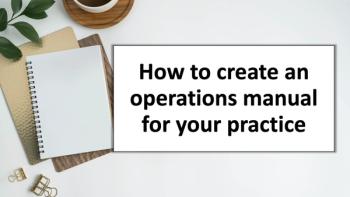
Ripped Off!
Medicine has a very high incidence of embezzlement. Here's how to protect yourself.
Think your practice's finances are safe in the hands of your trusted staff? Think again.
Medical practices suffer from one of the highest embezzlement rates of all service industries, so don't think it can't happen to you. If you're not taking some relatively simple steps to prevent someone on staff from skimming profits, you may find yourself left high and dry - and dazed by the experience.
It can happen in two months or two years, says Lamar Blount, president of Healthcare Management Advisors (HMA) in Atlanta - and internal thieves can get away with hundreds of thousands of dollars.
What's more, says Blount, theft may only be detected through a routine examination of office procedures or a chance event. And by then, he warns, it may be too late.
Though by no means an epidemic, theft committed within physician practices is nonetheless a big enough concern to warrant serious discussion. Whether you're a small practice or a large one doesn't seem to make much of a difference, although having "a limited staff may enhance the problem," Blount says.
Simple awareness
Fewer staff means fewer checks and balances. Ask yourself: is the person who counts and records collections at the end of the day the same person who makes the bank deposit? That overlap of responsibility makes it easy for that person to lift as little as $10 a day from collections - and put it straight into his or her pocket. How many staff members are responsible for paying bills - the practice's credit card, for example?
If you aren't reviewing charges on a regular basis, you could be setting yourself up for trouble. Stealing can be just as easy in a larger practice. For example, Blount explains, if someone in a large practice is terminated, a less-than-honest human resources person could leave the terminated individual on the payroll, open up a separate bank account, and start collecting the money.
And the problem isn't limited to non-medical office staff, says Victor Arnold of Vogt Management Consulting in Fairway, Kan. "Watch the partners, too," he says. "Doctors can be the worst."
Clearly, the most important thing a physician can do to avoid theft from his or her practice is to be attentive. That doesn't mean micro-managing the office - who has time for that? It does, however, require some vigilance and awareness of office practices.
"Any business in which cash is being exchanged is vulnerable," Arnold adds. "And where there's a will, there's a way."
Rethink responsibilities
Perhaps the best solution is to make certain that there is a separation of duties, suggests Blount. Receivables, payables, payroll, patient records - each should be prepared and completed by different individuals. If there is more than one cashier in the practice, each one should have separate - and lockable - cash drawers to avoid commingling of incoming funds and receipts.
"If one person is running the office, the temptation to take money may become overwhelming," he cautions. "Or that person's own financial need may drive him or her to take chances not normally thought of."
For example, in one practice, the office manager paid her own mortgage and credit card every month out of the office's general bank account. Since she reconciled the checking account each month, the physician had no idea what was going on - until the office manager took a vacation and the doctor decided to take a look at the statement.
Blount suggests that physicians make a habit of reviewing monthly bank statements and canceled checks. Make sure the bank provides a dated and time-stamped receipt for each deposit, and match receipts with deposit slips. Have actual statement reconciliations completed by someone outside the office, if possible.
Also, be cautious about giving employees signature rights. Money can be easily diverted through unauthorized expenditures, and banks will not question an office representative who was given check-signing authority.
For further protection, instruct the bank to disallow wire transfers to accounts not owned by the practice - and reconsider allowing your signature to be applied to checks by a preprinted stamp.
If your employees who handle funds are not bonded, consider bonding them. In cases of theft, a bonding company will repay your loss and aggressively seek recovery from the culprit.
Finally, develop written procedures for handling money in the practice. Have employees sign a document that they have read and agree to the written guidelines. With a standardized set of procedures in place, irregularities will be easier to spot.
These are small steps to take, and perhaps slightly inconvenient, but they may ultimately protect the financial future of your practice.
Make a move
"Problems usually surface pretty quickly, but you have to pay attention to them so that they don't continue," Arnold says. That means physicians need to be aware of the warning signs. For example, be aware of an employee making $10 an hour who suddenly begins making twice-monthly trips to Las Vegas - or one who refuses to take vacations at all.
Question sudden decreases in cash flow on a daily or monthly basis, unexplained or suspicious account write-offs and transfers, and unbalanced daily receipts.
Keep an eye out for small amounts of money consistently missing - from a petty cash drawer, for example. "Unusual write-offs are probably the biggest red flag," says Arnold, "as are unusual employee lifestyle changes." Any of these may serve as a sign that something is not quite right.
At that point, it's up to the physician or practice manager to begin asking questions - and getting answers. The biggest mistake that a practice can make when catching someone in the act of stealing is to avoid pursuing legal action, says Blount. If left alone, an embezzler will do it again, and probably to a larger degree.
Physicians who don't prosecute when they have caught someone red-handed usually cite concerns about the time involved in legal proceedings, negative publicity, perceptions of their own "stupidity," and the specter of raising questions about the practice in patients' minds. "It's just a bad decision to not do anything - or to simply fire the person and forget about it," Blount says.
Arnold agrees, suggesting that, if you discover internal theft from your practice, immediately fire the employee or employees involved - and remember that physicians can be guilty, too. Next, contact the prosecuting attorney's office and your CPA so they can begin to sort out exactly what has been happening. Finally, let everyone on the staff know what has happened, but be discreet with the details. Don't punish the remaining, honest employees by adopting an atmosphere of mistrust.
Daphne Swancutt can be reached at
This article originally appeared in the September/October 2001 issue of Physicians Practice Digest.
Newsletter
Optimize your practice with the Physicians Practice newsletter, offering management pearls, leadership tips, and business strategies tailored for practice administrators and physicians of any specialty.








